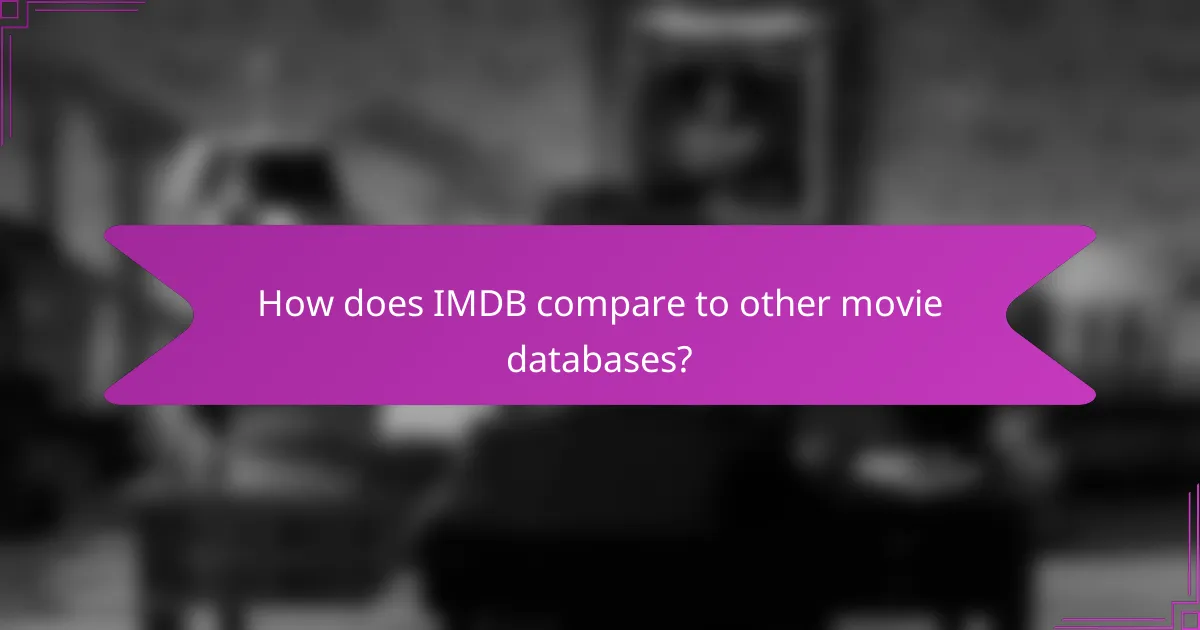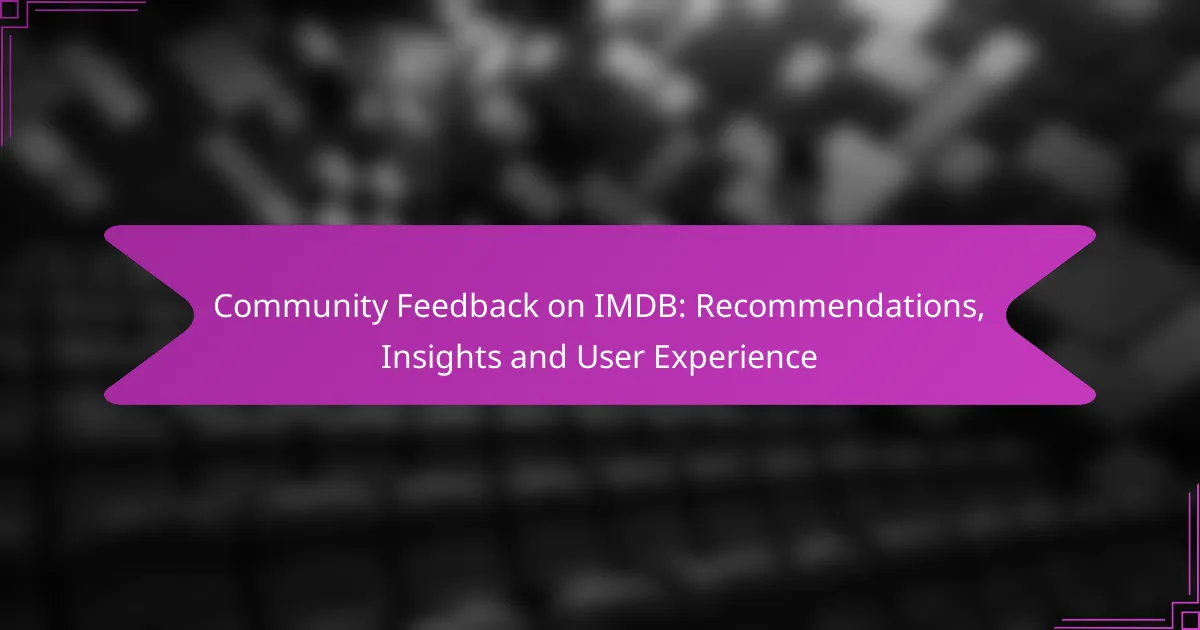Community feedback on IMDB is essential for refining the platform and enhancing user experience. Users have shared valuable recommendations focusing on usability, search functionality, and personalized content, which directly influence updates and improvements. By analyzing these insights, IMDB can prioritize changes that boost user satisfaction and engagement.

What are the key recommendations from IMDB users?
IMDB users have highlighted several key recommendations aimed at enhancing their overall experience on the platform. These suggestions focus on improving usability, search capabilities, and content personalization to better meet user needs.
User interface improvements
Users frequently suggest that IMDB could benefit from a more intuitive user interface. Simplifying navigation and reducing clutter can help users find information quickly and efficiently. For instance, consolidating menus and enhancing visual hierarchy can make the site more user-friendly.
Another recommendation is to improve mobile responsiveness. As many users access IMDB via smartphones, optimizing the mobile interface for better performance and accessibility is crucial. Features like larger buttons and streamlined layouts can significantly enhance the mobile experience.
Enhanced search functionality
IMDB users have expressed a desire for more robust search functionality. Implementing advanced filtering options, such as genre, release year, and user ratings, can help users locate specific titles more easily. This can be particularly useful for those looking for niche films or TV shows.
Additionally, incorporating natural language processing could allow users to search using conversational phrases. For example, allowing queries like “best sci-fi movies from the 90s” can make the search experience more intuitive and user-friendly.
More personalized content suggestions
Personalization is a key area where IMDB users seek improvement. By leveraging user viewing history and preferences, IMDB can provide tailored content recommendations that align with individual tastes. This could involve suggesting similar titles based on past ratings or highlighting trending shows in a user’s preferred genres.
Moreover, users appreciate the idea of customizable watchlists that adapt based on viewing habits. For example, if a user frequently watches documentaries, the platform could prioritize similar content in their recommendations. This level of personalization can significantly enhance user engagement and satisfaction.

How does community feedback shape IMDB’s features?
Community feedback plays a crucial role in shaping IMDB’s features by directly influencing updates and enhancements based on user preferences and experiences. This feedback loop allows IMDB to prioritize changes that enhance user satisfaction and engagement.
User-driven feature updates
User-driven feature updates on IMDB are often initiated through suggestions and feedback collected from the community. Users can submit ideas for new features or improvements, which are then evaluated by the IMDB team based on feasibility and demand.
For instance, if a significant number of users request a more advanced search filter, IMDB may prioritize the development of that feature. This responsiveness ensures that the platform evolves in line with user needs, fostering a more personalized experience.
Impact on content curation
Moreover, IMDB often analyzes trends in user feedback to identify popular genres or themes, which can influence content recommendations and promotional strategies. This dynamic approach ensures that users are presented with relevant content that aligns with their interests.

What insights can be gained from user experiences on IMDB?
User experiences on IMDB provide valuable insights into the platform’s usability, content quality, and community engagement. Analyzing feedback reveals trends in user satisfaction, common issues, and positive experiences that can inform potential users and stakeholders.
User satisfaction ratings
User satisfaction ratings on IMDB reflect overall contentment with the platform’s features and offerings. Many users express appreciation for the extensive database of films and TV shows, often rating their experiences positively on a scale from 1 to 10. Typically, satisfaction ratings hover in the range of 7 to 9, indicating a generally favorable reception.
Common user complaints
Positive user testimonials

What are the trends in community feedback on IMDB?
Community feedback on IMDB reveals a growing focus on user experience, particularly regarding mobile accessibility and social interaction features. Users are increasingly expressing their preferences for a more engaging and mobile-friendly platform.
Shift towards mobile usage
The trend towards mobile usage is evident as more users access IMDB through smartphones and tablets. This shift necessitates a responsive design that accommodates various screen sizes and improves navigation for mobile users.
To enhance mobile experience, IMDB should prioritize fast loading times and simplified interfaces. Users typically expect load times under two seconds, making performance optimization crucial for retaining engagement.
Increased demand for social features
There is a notable demand for enhanced social features on IMDB, as users seek to connect with friends and share their movie experiences. Features such as user reviews, ratings, and discussion forums can foster a sense of community among film enthusiasts.
Implementing social features could include options for users to create watchlists, share recommendations, and follow friends’ activities. This not only enriches user experience but also encourages more frequent interactions on the platform.

How does IMDB compare to other movie databases?
IMDB stands out as one of the most comprehensive movie databases, offering extensive information on films, TV shows, and industry professionals. While it excels in user-generated content and ratings, other platforms like Rotten Tomatoes and Letterboxd provide different focuses that cater to specific audience needs.
Comparison with Rotten Tomatoes
Rotten Tomatoes primarily aggregates reviews from critics and audiences, providing a percentage score that reflects overall reception. This focus on critical consensus allows users to quickly gauge whether a film is worth watching based on expert opinions.
In contrast, IMDB offers a broader range of user-generated ratings and reviews, which can provide a more diverse perspective. While Rotten Tomatoes may be ideal for those seeking critical insights, IMDB is better suited for users looking for detailed information on cast, crew, and production details.
Comparison with Letterboxd
Letterboxd is a social platform that emphasizes user interaction, allowing film enthusiasts to log their viewing experiences, write reviews, and create lists. This community-driven approach fosters discussions and recommendations among users, making it a favorite for cinephiles.
While IMDB provides a wealth of data, it lacks the social features that Letterboxd offers. Users who value community engagement and personalized recommendations may prefer Letterboxd, whereas those seeking comprehensive film data and industry information will find IMDB more beneficial.

What are the prerequisites for effective user feedback on IMDB?
Effective user feedback on IMDB requires clear communication, a diverse user base, and accessible feedback channels. These factors ensure that user insights are relevant, actionable, and representative of the broader audience.
Understanding user demographics
To gather meaningful feedback, it’s essential to understand the demographics of IMDB users. This includes age, location, and viewing preferences, which can significantly influence the type of feedback received. For example, younger users may focus on streaming trends, while older users might prioritize classic films.
Analyzing user demographics can help tailor feedback requests. Consider segmenting users by age groups or geographic regions to identify specific interests and concerns. This targeted approach can enhance the relevance of the feedback collected.
Analyzing feedback channels
Identifying and utilizing the right feedback channels is crucial for effective user engagement. IMDB users can provide feedback through various platforms, including forums, social media, and direct surveys. Each channel offers unique advantages; for instance, social media can yield quick responses, while surveys may provide more in-depth insights.
It’s important to monitor these channels regularly and adapt strategies based on user engagement levels. For example, if feedback is consistently low on one platform, consider enhancing incentives or simplifying the feedback process to encourage participation.



